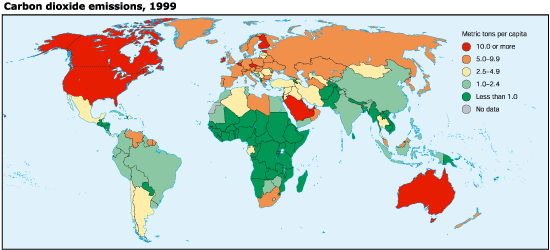BY ANASTASIYA PONOMARYOVA
As a primary test of the informally adopted, non-binding Copenhagen Agreement, the countries responsible for the bulk of the climate-changing pollution submitted their goals to reduce the harmful emissions. This agreement was put together at the United Nation-sponsored summit against climate change. Its main goal is to limit the global warming to 3.6-degree increase from the pre-industrial era. The Unites States, twenty-seven of the EU nations, China, India, Japan, and Brazil supported the agreement by sending in their strategies to better the environment. These countries are currently responsible for 78% of the greenhouse emissions. Two of the major nations—Russia and Mexico—have not submitted their proposals by the Jan. 31st deadline.
The submission of the proposals is an important indication the wealthiest nations of the world are determined to fight for a better environment. This is the first time countries have put on paper their plans for a more sustainable development. The proposed reductions, however, still do not meet the central goal of the Copenhagen agreement. Another problem faced by the United Nations is lack of financial aid for the developing countries to adapt to environmentally friendly paths of industrialization. It will be interesting to see the nations implementing their proposed strategies.
Reference
Broder, J. “Countries submit emission reductions”. The New York Times, Feb . 1, 2010
Wednesday, February 3, 2010
Subscribe to:
Post Comments (Atom)

I think the real problem lies with states like Russia and Mexico, major nations who have not been bound to an agreement yet still reap the benefits of a reduced co2 plan. The global warming problem has no boundaries- thus countries who don't join in may be building up their industrial and economic sectors while we among others are cutting down... where is the incentive to continue with our efforts?
ReplyDeleteThere is a large difference between a plan in theory and a plan put into effect. I think the biggest problem that these nations are going to have to overcome is putting their plan into effect in a quick and timely manner. These nations certianly have the resources to make such changes, but will they be willing to implement these changes quickly enough so as to mitigate climate change effects? That should be the next big commitment these nations should submit at the Copenhagen climate discussion.
ReplyDeleteEmissions reduction by participating countries undoubtedly creates positive externalities for non-participating parties to benefit. This would reduce incentive for any party to participate, and so it seems that making participation economically profitable is one of the best ways to ensure the international community meets its projected goals.
ReplyDeleteI am interested in seeing a binding agreement to reduce climate change and the penalties for non-compliance. States like Mexico and Russia pose a big problem, progress being held back by nations not meeting their obligations. These states should be subject to international pressure to comply.
ReplyDelete